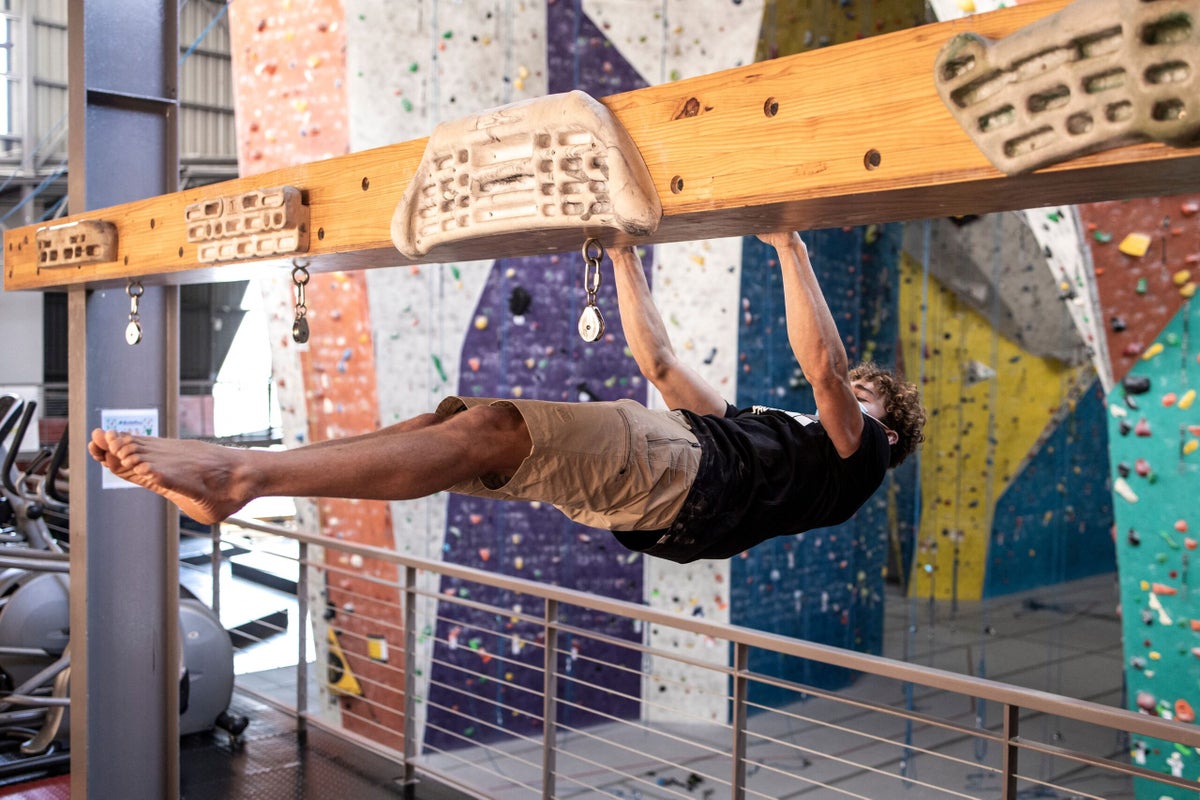
Want to keep your feet on, hold those swings, and move with control? Your core can help with that.
The post 10 Exercises for a Complete Climber Core appeared first on Climbing.
]]>
A strong core is crucial to progressing as a climber. Body tension, keeping your feet on, moving efficiently, toeing-in on overhangs—it all revolves around the core. Plus, a solid core helps prevent injury. You’ve probably heard a core-strength evangelist preach the benefits before, and you’ve probably been pointed toward endless crunches or even expensive programs like Pilates, TRX, or yoga. Get ready for a new approach: varied exercises that are specifically targeted to work multiple parts of your body at the same time—just like climbing does.
Guidelines
- Pick five or more of these exercises and do them at least three (and up to five) times a week for best results
- Add as many sets or exercises as you need to feel the burn; you should be struggling to complete the last set
- Do these any time—end of a climbing session, on a rest day, in the morning before work—but avoid doing them right before you climb, as this could make your base tired and give you poor, injury-causing technique
- A good core workout hits all aspects of your trunk, not just the abs in the front. Each of these exercises has varied motions to work your front, back, and sides
- Take at least one to two rest days every week to let your muscles recover
- If you have a history of back or neck problems, consult your doctor before starting high-intensity exercises like these.
1. Hanging Leg Lift
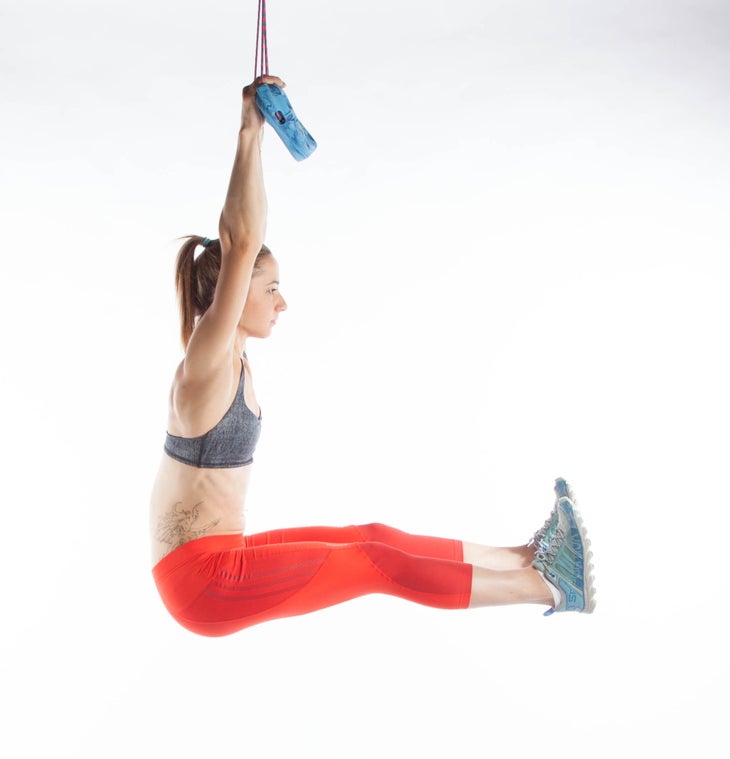
Start on the jugs of a hangboard or a pull-up bar. Keep your arms straight, shoulders engaged (squeeze shoulder blades together), and legs straight down. Lift your legs up so your hips are at 90°, without bending your knees. When you lower back down, keep your body as still as possible (you’ll have a tendency to swing). Raise your legs again without using momentum. Do three sets of 15, resting about one minute in between.
Variation
For a tougher challenge, raise your legs with knees bent, pulling them all the way into your chest. Or try just hanging with knees bent, hips at 90°, and have a friend put weight on your lap. Start with 10 to 15 pounds, hanging for 15 seconds. Have your friend remove the weight before lowering legs.
Focus
Abs, lower back, hip flexors
2. Arm Dip

Stand straight, feet shoulder-distance apart. Choose a dumbbell that will provide good resistance; 15 pounds is a good starting point. Hold it in your left hand and slowly lower your left shoulder straight down, as far as it will go. Try to keep your right hip in line with your body; don’t let it jut out to the side. In a controlled motion, bring the weight and your body back up to the starting position. The up and the down should be two separate motions. Do 20 reps and then switch arms.
Focus
Obliques
3. Sit Up, Stand Up
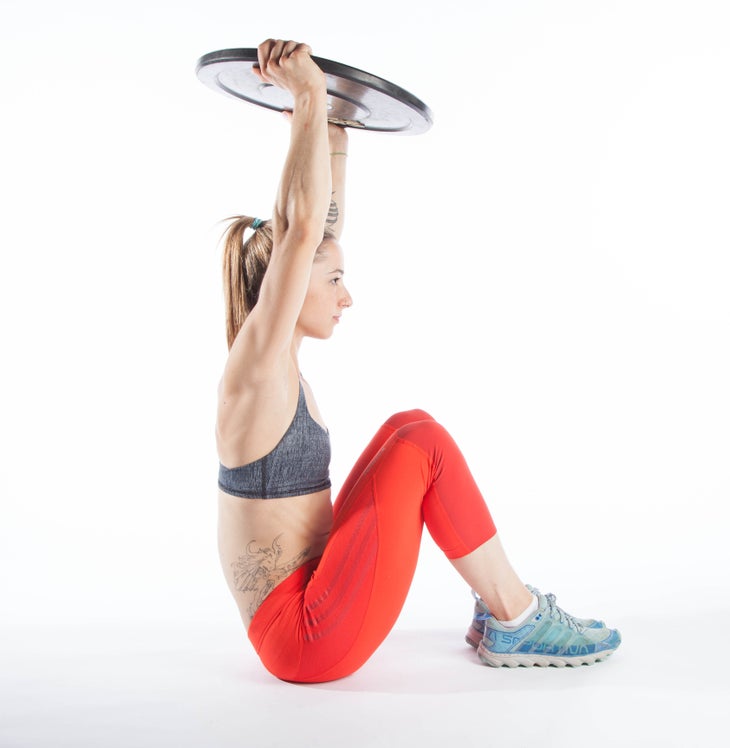
Lie with your back on the ground, knees bent, feet flat on the floor. Hold a weight plate (start with 20 lbs.) near the ground with arms straight out from your head. Using momentum, do a sit-up with the plate in the air, get your feet under you near your butt, and stand up all the way—keeping the plate in the air. Lie back down in the starting position (plate doesn’t have to be up when sitting back down, but don’t put it on the ground); repeat 15 times.
Focus
Abs, hip flexors, hamstrings, quads, shoulders
4. Wheelbarrow Walk
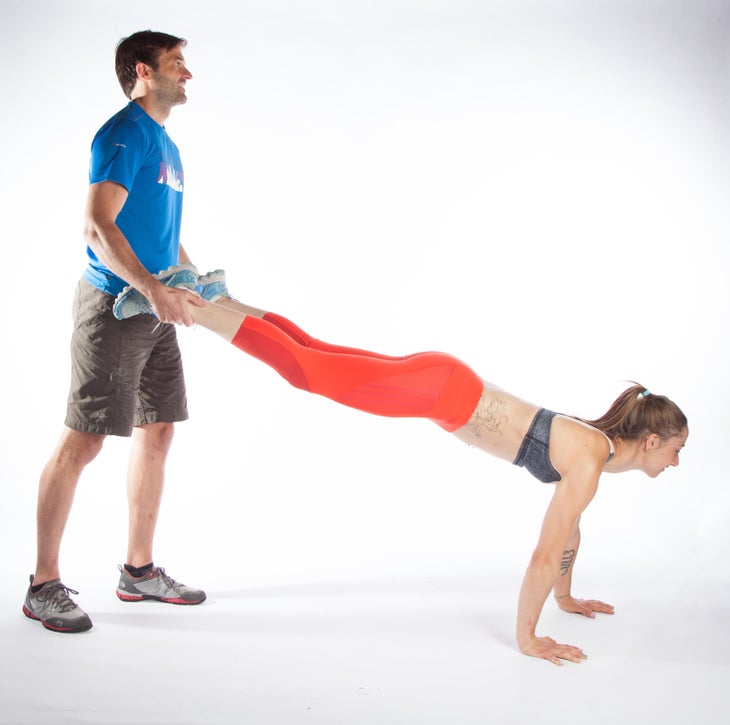
Those wheelbarrow races you did as a kid are actually great for your core. Get into a high plank, with your hands directly below your shoulders. Have a partner lift you by your ankles. Keeping your body straight (don’t dip at the waist) and looking straight ahead, move your right hand forward about six inches. Then move your left hand up six inches past your right, finding a good pace for you and your partner to avoid face planting. Keep your core and glutes contracted to maximize the movement. Go about 30 feet, then switch with your partner. Try to do five rounds, without compromising technique.
Focus
Obliques, abs, lower back, glutes, shoulders, arms
5. Oblique Knee Raise Plank
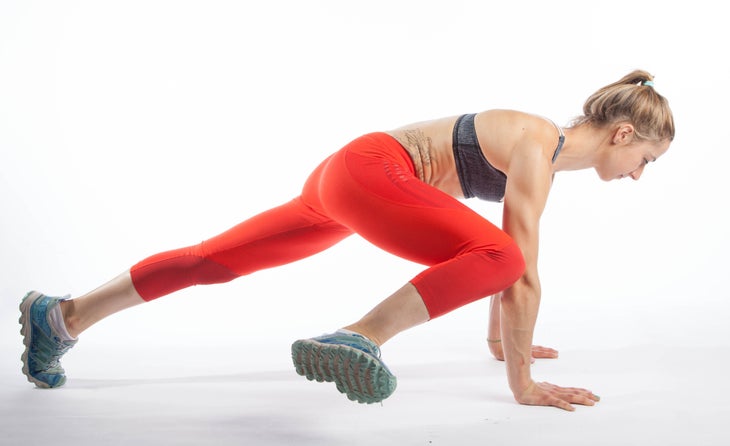
Start in a high plank. Bend one leg and bring your knee to just outside the corresponding elbow. This should open your groin up to the ground as you move your knee up. Return to starting position and repeat with the other leg. Keep it controlled but maintain a steady pace. Do this for one minute.
Focus
Abs, lower back, obliques, glutes, hip flexors, shoulders, chest
6. Farmer’s Walk

Pick two weights that are in the high end of your comfort range. Holding one in each hand, start walking. For this motion to be effective, keep your core tight and your posture straight, standing as tall as you can. Either go for distance (50 yards) or time (1 minute). If you want to test yourself, walk until your arms are about to give out; just be careful not to drop the weights.
Variation
Instead of using the same weight in each hand, hold a weight that’s about five pounds heavier in one hand. This will force you to keep your core tight as you try to balance the two different weights.
Focus
Lower back, obliques, abs, forearms, hamstrings, quads, calves
7. A-Frame Arm Drop

Begin in a C-sit position, knees bent at 90°, abs engaged so upper body is off the floor, and just heels on the ground. Put both arms straight above your head, holding palms together. While keeping your upper and lower body completely still, slowly lower your arms down to the right of your hip, tap the floor, and bring them back up overhead. Now lower to the left side. Do 30 total, 15 per side.
Focus
Abs, obliques, lower back, shoulders
8. Plank Variations
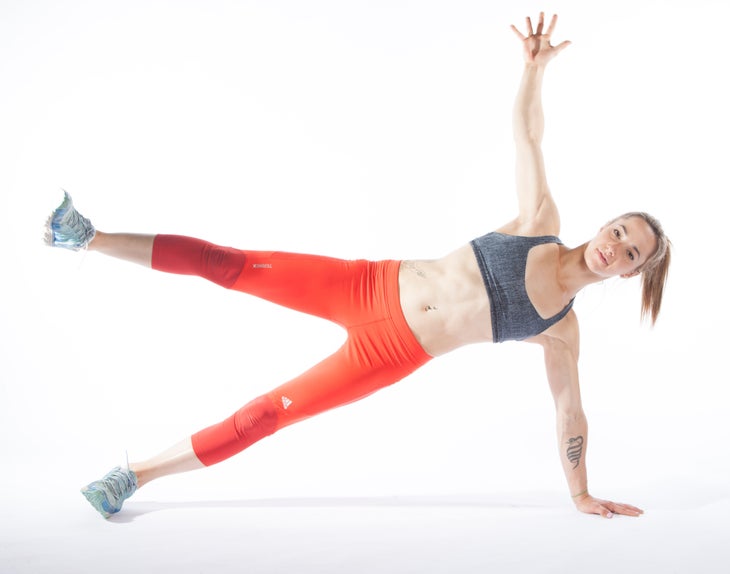
With a full-body burn, it’s hard to ignore planks as an effective core-strengthening exercise, but here are a few variations to keep it interesting. For each, keep muscles engaged and actively holding the plank. Start with three rounds of one minute, resting one minute between rounds.
Elevated plank
This is a standard high plank, but you want your toes up on an elevated surface (bench, chair, etc.), so that your whole body is parallel to the floor. Use a wobbly exercise ball for increased difficulty.
Sideways walking plank
Get into high-plank position. From here, move your right hand about six inches to the right, and then move your left hand six inches right. Move your left hand back to starting position and follow with your right. Go to the left side, then repeat.
Side plank with leg raise
In a side-plank position (left hand on floor directly under shoulder, body straight, balancing on outside edge of left foot), raise the right leg so your feet are wider than your shoulders and hold.
Focus
Full body
9. Kettlebell Figure Eight

Start with legs a little wider than shoulder width, and bend at the waist, keeping your back flat and head up. Use a lightweight kettlebell and go around your right leg with your right hand, then pass it under your right leg to your left hand. Repeat on the left side. That’s one rep; repeat 15 times.
Focus
Abs, lower back, glutes, hip flexors, obliques, arms, quads
10. The Matrix
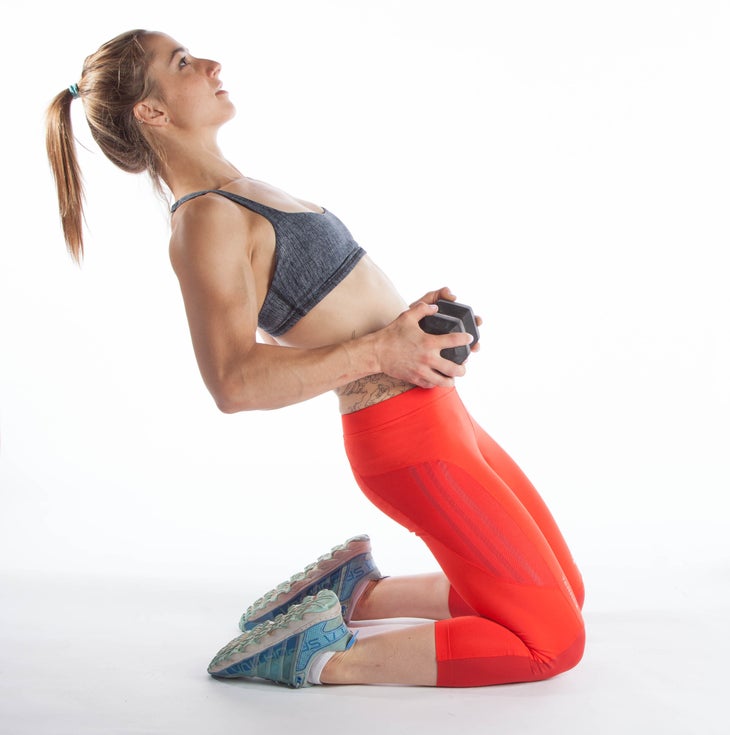
Start on knees that are hip-width apart with a straight back. Hold a weight near your belly button and slowly lean back as far as you can, keeping your back straight. Hold for three seconds, and then slowly come back to the starting position. Repeat 20 times.
Focus
Abs, lower back, glutes, quads, hip flexors
This article originally appeared in Climbing in 2014.
The post 10 Exercises for a Complete Climber Core appeared first on Climbing.
]]>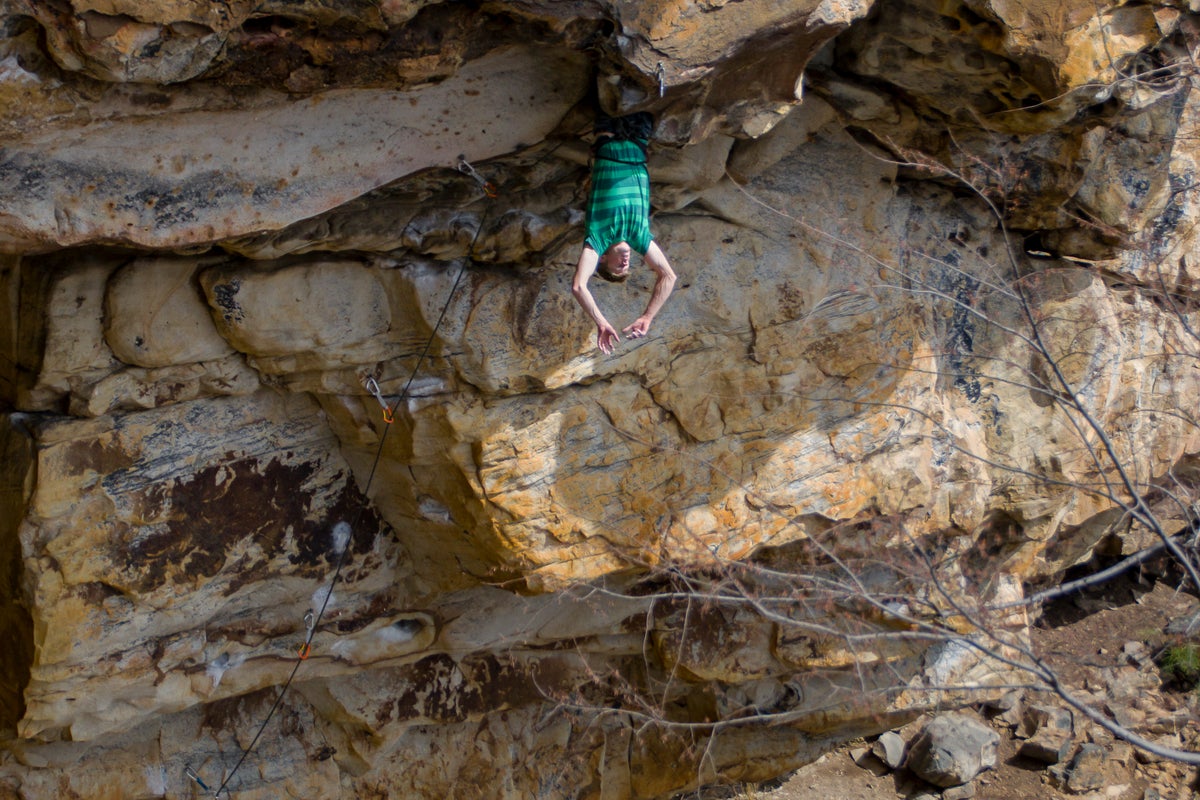
This story originally appeared in the October 2014 issue of our print edition. Tyler Wilcutt on the first ascent of the hardest route near Chattanooga: El Camino del Diablo (5.14b). Photo: Matt Ballard The Southern Cragging Capital Nowhere in the South is there such a high concentration of lifelist climbing destinations. Within an hour’s drive … Continued
The post Chattanooga, Tennessee Rock Climbing Destination Guide appeared first on Climbing.
]]>
This story originally appeared in the October 2014 issue of our print edition.
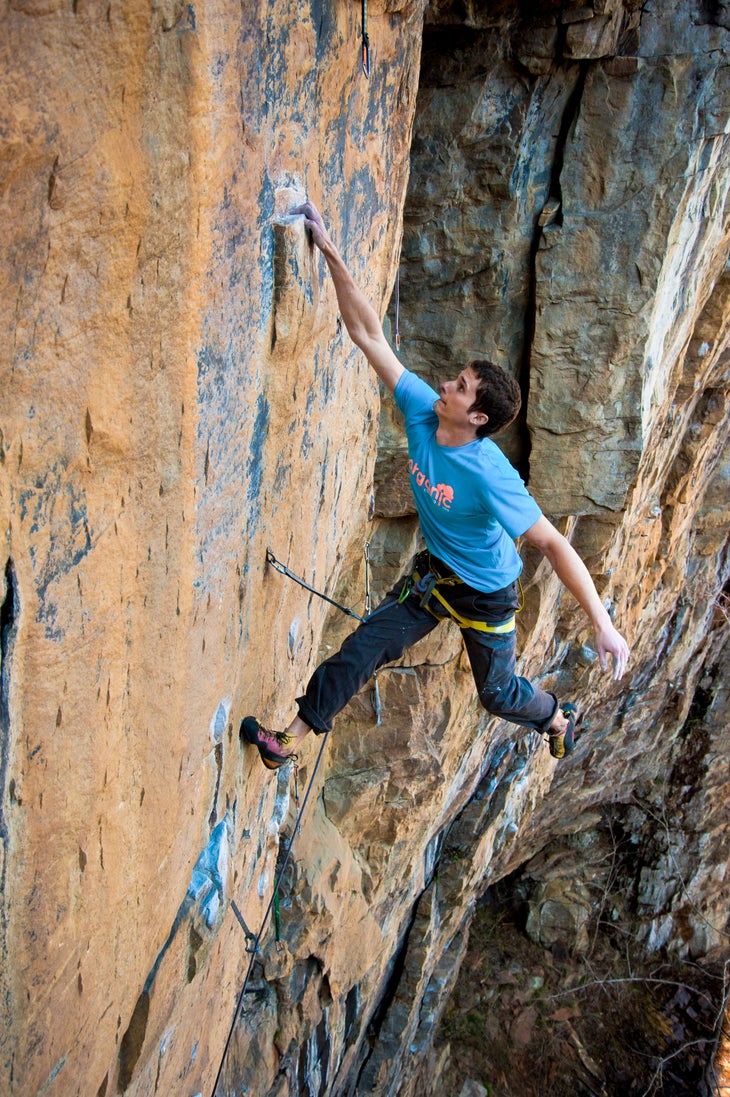
The Southern Cragging Capital
Nowhere in the South is there such a high concentration of lifelist climbing destinations. Within an hour’s drive of Chattanooga are eight crags, each with enough routes to last most climbers a lifetime. And if you ever get tired of Chattanooga (not likely, its population has grown every year for the past 20), there are dozens of other climbing areas to keep you busy near Nashville to the northwest and Knoxville to the northeast, both less than two hours away. The city of more than 170,000 just opened one of the country’s most innovative rock gyms. High Point Climbing and Fitness has 28,000 square feet of climbing inside—and out. The facility has transparent exterior walls with multiple routes. The town has even lured badasses like Lisa Rands and Wills Young to take up residence; the pair runs High Point’s climbing school. In short, this laid-back town is a must-stop for any road tripper or itinerant rock climber looking for a home.
Much of the climbing in Tennessee is on the Cumberland Plateau, a 300-mile ridge that stretches into Alabama and Kentucky. The rock is hard, high-quality sandstone, and the terrain can include long crack climbs as well as overhanging jug-fests; the variety is incredible.
The area boasts climbing year-round, and in the dead of winter, you’ll see climbers on the rock in their T-shirts at south-facing crags like Tennessee Wall (aka T-Wall). When summer is at its hottest, Sunset Park is a great destination; the west-facing cliff stays shady until well into the afternoon. But it’s not all milk and honey; it can get stiflingly humid in summer. Plan for a fall or winter visit. October and November are pitch-perfect.
There’s plenty to do no matter what your climbing style. For trad leaders, T-Wall and Sunset are the top choices; others include Suck Creek Canyon and Prentice Cooper. Sport climbers can clip bolts at Foster Falls and Obed. And there’s a little of both at Leda. For the truly adventurous who want to carve out their own routes, there’s Big South Fork, a real climbing frontier.
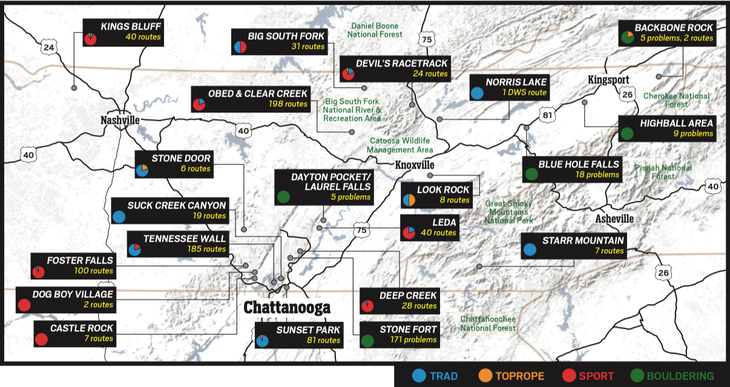
Where to Stay
If you want to set up camp, hit the parking lot of Tennessee Wall in the Prentice Cooper Wildlife Management Area. There are plenty of car camping sites and a pit toilet. Bonus! It’s free—first come, first served. If you’d like a real bed and roof (or need to find climbing partners), try out the Crash Pad (423-648-8393). This hostel is the unofficial basecamp for visiting climbers (hikers and boaters, too) with community rooms (starting at $28 per night for a bunk) and private rooms. Nice: free Wi-Fi and a DIY breakfast bar.
Where to Eat
Check out the Flying Squirrel. This local bar and restaurant is a favorite among traveling climbers. Open until 3 a.m., this joint serves everything from kale salads to duck tacos. They have a Sunday brunch menu as well, with Sriracha Bloody Marys and a dish called Dirtbag Benny (two small pieces of waffle, fried eggs, avocado slices, and bacon bits with molasses). With an extensive list of craft beers and house cocktails, this place is sure to please. (Tip: If you’re staying at the Crash Pad, be sure to mention it—you’ll get a discount on your bill.) If you’re looking to get caffeinated before a day of climbing, head to Mean Mug Coffeehouse (423-825-4206) for locally roasted coffee, specialty lattes, and a full lunch menu.
Where to Buy Gear
Rock/Creek (888-707-6708) has four locations in Chattanooga alone. They carry a wide variety of outdoor gear, from apparel to any climbing gear you left as booty at the last crag. These guys are super-involved in the climbing scene in Chattanooga and have helped with many projects over the years, including building the parking lot and camping area at Tennessee Wall. Look around the store for local gear company Granola. They hand-build chalkbags, day packs, and the Camp Grounds Coffee Kit, which includes an AeroPress, a burr grinder, two cups, and locally roasted coffee.
Where to Learn the Ropes
Let Rocky Top Guides (706-333-2089) show you around. They offer a wide variety of courses, including a rescue course and a Transition from Indoors class, for those who want a bit of training before taking on real rock. Or look up Lisa and Wills if you stop into High Point Climbing and Fitness (432-602-7625). They offer everything from basic instruction to personal training and guiding.
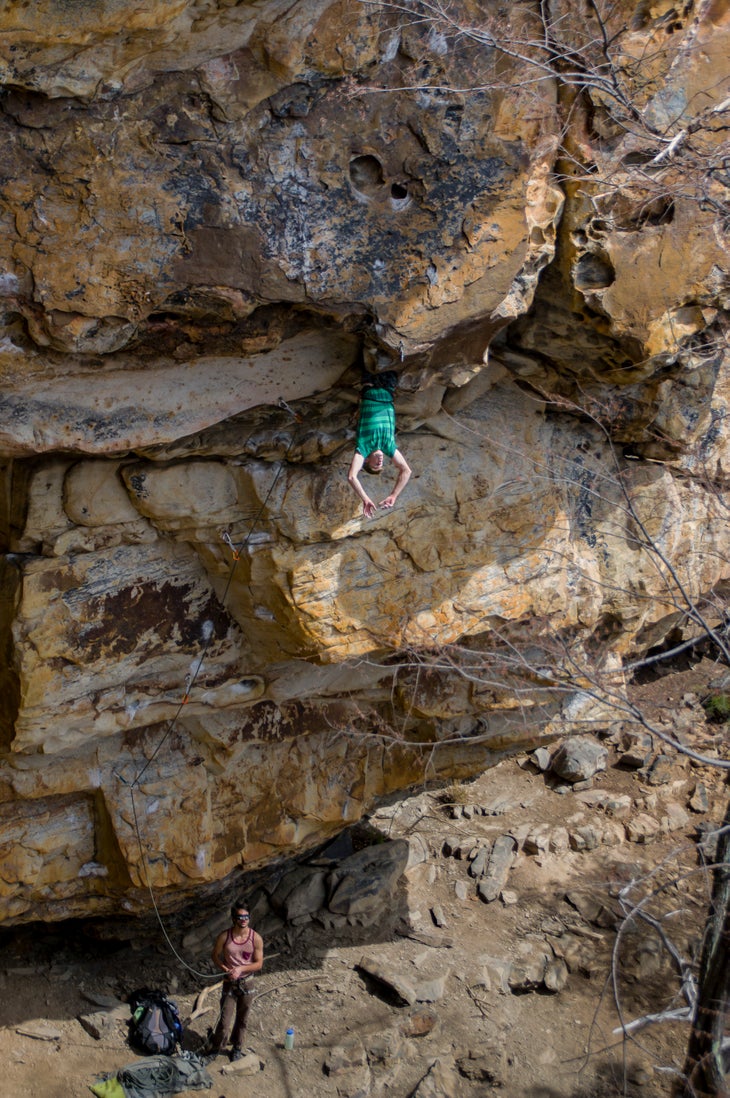
What to Climb: The 10 Best 4-Star Routes
As ranked by Mountain Project users
Golden Locks (5.8+)
Tennessee Wall
“Beautiful splitter crack with exposure above the Tennessee River, the most popular and perhaps the most sandbagged route.”
Open Casket (5.9)
Tennessee Wall
“You think this cannot be 5.9, yet unlikely reaches to secret jugs with wild stemming across the chasm and locker hand jams under the huge chockstones prove you wrong. High Indiana Jones value on this one.”
Holy War (5.9)
Foster Falls
“Argued to be the best of the grade at Foster Falls, and I would have to agree. The climbing is pretty continuous and interesting with a wide variety of moves—crimps, jugs, flakes, and even a mono pocket!”
Hurts So Good (5.10a)
Foster Falls
“A long, fairly sustained route with a bouldery start followed by a very thin finish with lots of jugs in between. Crux comes at the ‘roof’ and the thin face crimpers near the end.”
Stepping Stone (5.10a/b)
Tennessee Wall
“This is one of the best single pitches you will do anywhere. Place your pro well on the bottom section. Easy and well-protected terrain leads to a committing situation on the arête, at which point you’ll want to begin channelling your inner sport climber by firing for the top like you really mean it. Good pro is there for the taking, but it’ll cost you some burn time on those forearms.”
Something’s Always Wrong (5.10d)
Foster Falls
“No argument about it. Best 5.10 at Fosters. Move left after the roof for a good rest before you tackle the overhanging face at the top.”
Sugar in the Raw (5.11a)
Tennessee Wall
“Classic route with bouldery moves and small but good gear. Milk all the rests and don’t pass up any placements. Pull a hard roof and then move to good stances. Follow the thin cracks with decent pro to the crux that comes in the middle, then go up through several moderate roofs to the anchor.”
Hersey (5.11b)
Obed
“Probably my favorite climb at the Obed. The sloper crux down low is a fun little boulder problem, and the jug-fest roof is just good, clean fun. Highly recommend this one. It’s like climbing a sandstone jungle gym.”
Solstice (5.12a)
Obed
“This is a pumpy climb with an amazing roof. Fall off anywhere, and you’ll have a heck of a time getting back on the route.”
Twistin’ in the Wind (5.12c)
Tennessee Wall
“Touted by some as one of the best sport routes in the South. Certainly one of the best at T-Wall and is a must-do if you have what it takes.”
Metrics
Quality
Nearly 600 routes at 3 stars or higher
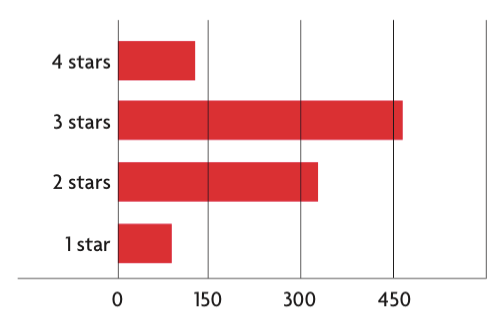
StyleParadise of sport and trad cragging
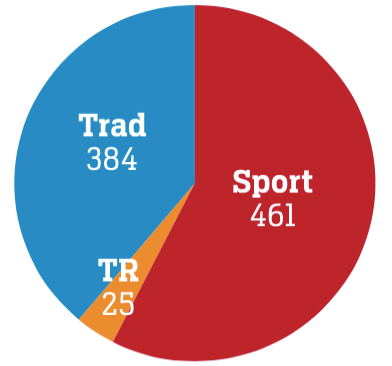
Difficulty
A moderate climber’s heaven

Get route beta, photos, and topos for the whole state at Mountain Project.
The post Chattanooga, Tennessee Rock Climbing Destination Guide appeared first on Climbing.
]]>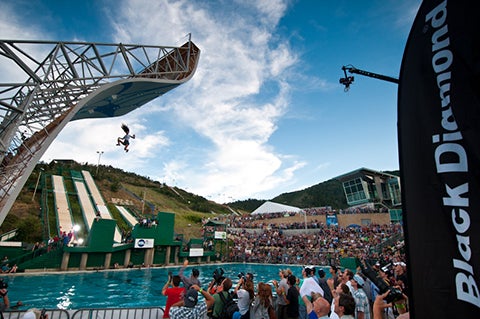
Photo: Alton Richardson. 7/18/14 – This August, The Psicobloc Masters Series will return to Park City, Utah. Psicobloc, organized by Chris Sharma, is America’s first-ever deep water solo competition (watch the 2013 highlight reel). Competitors face off, tournament style, to ascend an overhanging 50-foot wall above a 10-foot-deep pool. We awarded Psicobloc our 2013 Golden Piton … Continued
The post Psicobloc Masters Series Returns For 2014 appeared first on Climbing.
]]>
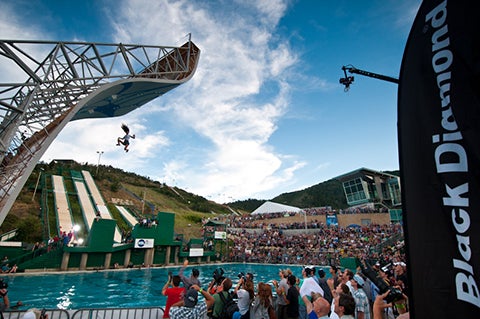
7/18/14 – This August, The Psicobloc Masters Series will return to Park City, Utah. Psicobloc, organized by Chris Sharma, is America’s first-ever deep water solo competition (watch the 2013 highlight reel). Competitors face off, tournament style, to ascend an overhanging 50-foot wall above a 10-foot-deep pool. We awarded Psicobloc our 2013 Golden Piton award for breathing new life into the American climbing competition scene, drawing over 2,500 spectators out to watch the finals, and nearly 20,000 more from over 100 countries tuned in for the live stream.
Last year’s event caught the attention of the country’s best climbers, luring talent rarely seen in competition anymore, such as Lynn Hill, Tommy Caldwell, Dave Graham, and Sharma himself. This year’s roster is no less stacked. Sasha Digiulian and Jimmy Webb will return to defend their titles, facing stiff competition from the likes of Sharma, Delaney Miller, Daniel Woods, Alex Puccio, young super-crushers Ashima Shiraishi and Kai Lightner, and many more of today’s top climbing talent.
The inaugural event was invitation only for competitors, but this year will feature a qualifying round on August 6 at the Momentum climbing gym in Millcreek, Utah. Any climber can put their toprope skills to the test in hopes of advancing to the pool. The men’s route will be 5.13a and the women’s will be 5.12c. Four climbers of each gender will move on to the finals at the Utah Olympic Park.
“We are hoping some local climbers will make it through qualifiers and be able to compete against some of the worlds best,” said event representative Tim Akers.
Beyond the new qualifying round, the 2014 event will see the addition of a half-time show (TBD), more-accessible sponsor village, and general smoothing of the format. On the athlete’s side, there will be a better physical layout and hot tubs, similar to those used in diving competitions, to stay warm between rounds.
The Psicobloc Masters Series will take place on August 6 with qualifiers at the Momentum climbing gym in Millcreek. Placements will be held on August 7, and finals will be on August 8, both at the Utah Olympic Park. All events start at 6PM. Tickets for the finals start at $25 and can be bought here.
Want to try the wall yourself? Starting today, July 18, the pool will be open daily to daring climbers from 11 am to 6 pm, until August 24. A day pass will cost you $20, and give you access to eight routes, ranging from 5.9 to 5.13b. Setting was done by the crew at nearby Momentum Climbing. We recommend bringing plenty of old, dry climbing shoes.
For more info, check out psicocomp.com.
The post Psicobloc Masters Series Returns For 2014 appeared first on Climbing.
]]>